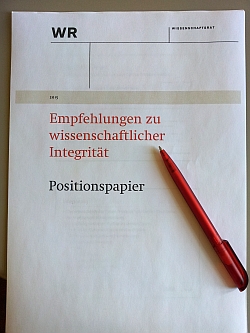German Council of Science and Humanities publishes Recommendations on Scientific Integrity
Posted: April 28th, 2015 | Author: Sven | Filed under: German, journals, Opinion, Report | Tags: ethics, German Council of Science and Humanities | Comments Off on German Council of Science and Humanities publishes Recommendations on Scientific IntegrityYeste rday, the German council of Science and Humanities (Wissenschaftsrat) published a 54-page position paper on scientific integrity (unfortunately in German only). In a press release the scientific body stated:
rday, the German council of Science and Humanities (Wissenschaftsrat) published a 54-page position paper on scientific integrity (unfortunately in German only). In a press release the scientific body stated:
“Prosperity and development of modern societies today depend to a large extent on the quality and progress of scientific knowledge. Therefore it is important that the public can trust in the ethical and quality standards of the scientific community. Cases of fraud and misconduct – particularly major fraud and plagiarism scandals – undermine that trust. In response to such cases of fraud and loss of confidence many scientific organisations have published rules and guidelines dedicated to a Good Scientific Practice in the last few years. The German council of Science and Humanities now has adopted a position paper and recommendations on scientific integrity.”
With this concept on the scientific integrity, the German council of Science and Humanities wants to expand the focus from the rules of good scientific practice to a more comprehensive culture of honesty and quality of scientific institutions. The Council states, that much more is needed than rules and recommendations. “An attitude towards scientific integrity” should be internalized by researchers. In particular the Council recommends conveying the topic of good scientific practice already to students starting their academic studies. Also advice and information in cases of conflict and a focus on quality rather than quantity in the research- and publication processes are mentioned in the paper.
The recommendations of the German council of Science and Humanities do not only refer to serious cases of fraud like the fabrication of data or plagiarism but also consider other forms of non-integer behavior. The position paper also explores conditions in the scientific system that can hamper research integrity. These include the pressure on scientists to publish as much as possible and in high-ranked journals. Coupled with difficult working conditions and strong dependencies, especially for young scientists a situation emerges, that may endanger acting with scientific integrity.
The position paper first of all lists some important recommendations on good scientific practice published in Germany and abroad. This list is followed by an evaluation which examined the status quo in Germany.
In a second chapter, the paper specifies some fields of action and gives recommendations for several stakeholders of the scientific process. One particular aspect worth mentioning especially from the perspective of our project is dedicated to publishers and editors of scholarly journals. Here the position paper states:
“Special attentions should be given to the reproducibility of research results. Here, the learned societies have a special responsibility. In order to verify research results in replication studies independently, access to primary research data is needed in some subjects.” (p.29)
In addition, special recommendations for editors, publishers and editorial offices are given:
“Editors, publishers and editorial offices of scholarly journals are responsible to adapt the publishing process. Acting with scientific integrity must not be impeded or even harmed. Negative findings as well as replication studies must always be publishable in renowned journals – either as a normal part of the main publication or in separate section. Errata and corrigenda should be systematically published and, for example, associated with the original publication in order to prevent the spread of false data. Online repositories offering access to research and metadata also are important measures to promote scientific integrity.” (p.43)
In my personal view I really appreciate the last two recommendations for scholarly journals, editors and publishers. Nevertheless many other parts of the paper appear a little bit helpless to me. For instance I don’t think that a simple appeal to return on the ethics in science is sufficient to escape the publish-or-perish culture.
The position paper already named some important aspects of the problem: Pressure on scientists to publish as much as possible and in high-ranked journals; difficult working conditions – in Germany often paired with temporary employment; last but not least strong dependencies of young researchers…
Today, the value of a researcher most often is measured by his or her amount of publications in A+, A and B journals. Besides, this amount of publications is misunderstood as a criterion for scientific productivity or even excellence. The misperception to put the sheer amount of publications in high-ranked journals on the level of scientific quality is a result of public policies demanding comparable assessments for researchers. The sheer amount of published papers often is the fertile ground for successful scientific careers (or, on the contrary, the sudden end of such a career for those who fail to do so).
And it appears disturbing to me that the same scientific bodies who called for quantitative evaluations and assessments of research based on research outputs now appeal to researchers to comply with scientific integrity. Of course scientific integrity is an extremely important asset in all scientific fields. It is the basis for valuable research and knowledge. But as long as there is no other (and hopefully better) opportunity to measure or to appraise scientific merits, all the pleas for scientific integrity will be unheard – simply because researchers’ careers massively depend on their output.
As long as the quantity of research outputs stays a dominant signal of scientific productivity, especially young researchers under pressure will weigh scientific integrity to their productivity. And unfortunately, not only a few of these people will conclude that it is much more beneficial to invest in another publication than to follow all aspects of scientific integrity.
Sad but true.







